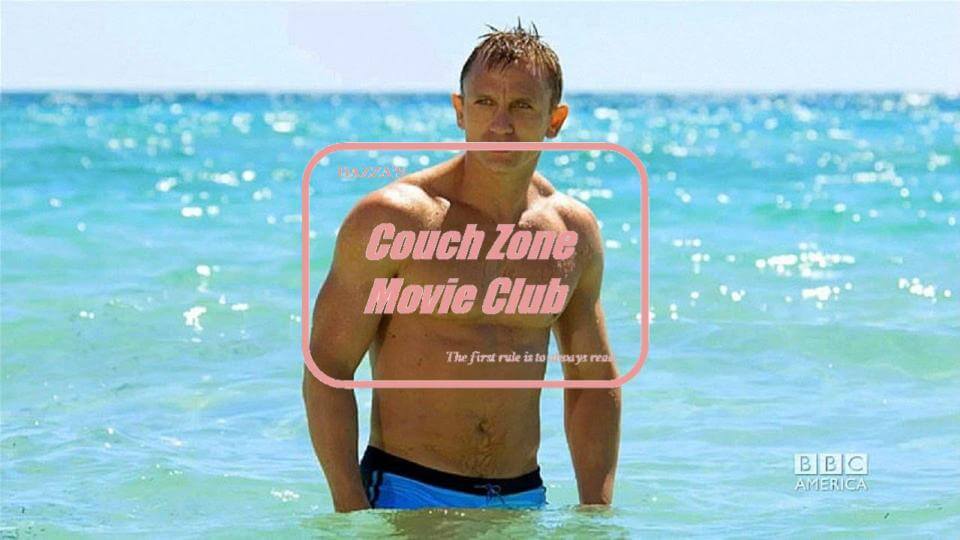It was exactly five years after 9/11 when Hollywood said “ok, that’s enough time passed let’s cash in, I mean make some poignant films about the attack on the WTC.” Keeping with the Hollywood tradition of releasing films in pairs, 2006 saw Flight 93 and World Trade Centre proving favourably with audiences and critics.
A larger trend in 2006 came in the form of reboots and remakes. Horror fans were hardly thrilled that beloved classics such as Omen, Wicker Man, the Hills Have Eyes got 21st century and grossly inferior make overs. Same was to be said for revisiting The Poseidon Adventure and The Pink Panther (incredibly Steve Martin’s ill judged attempt to step in Peter Sellar’s shoes spawned a sequel). Beloved television shows were not safe either as Miami Vice was made into charmless Michael Bay movie.
Even more bizarre was a number of sequels to decades ago movies. After a 12 year gap we caught up with Randall and Dante in Clerks II and it was almost 15 years after Sharon Stone had first flashed her crotch that we saw her shagging and killing in Basic Instinct II. After twenty years the saga of Superman was renewed with a brand new cast and with a timeline that simply didnt make sense.
Yet it wasn’t all bad when it came to remakes. Martin Scorsese disproved the old adage about Hollywood remaking foreign films always been horrible by turning Infernal Affairs into the incredible The Departed.
Meanwhile two of the best films of the year featured a full reboot of an iconic character and the return of another who we thought had seen an underwhelming sendoff some 16 years previous.
Rocky Balboa (director: Sylvester Stallone)

A simulated computer fight between Boxing legend Rocky Balboa and current champ Mason Dixon catches the imagination of sport fans, and inspires the most unlikeliest of comebacks.
Even as a Rocky fan, I admit I cringed when I heard that Stallone was once again going to don the gloves for one last reach for glory. Both Stallone and his character were in their late 50’s and the idea of him once again fighting seemed ridiculous and undignified. It didn’t help that the Rocky saga had taken strange turns since the feelgood but gritty tone of the original film back in 1976. Rocky II had been a justified and excellent sequel, but the third outing while enjoyable had started to descend into a formula. Rocky IV while a favourite with audiences was little more than a collection of music videos, and V took Rocky back to the streets in a promising story but which ended up scoring nominations for the Golden Raspberry awards.
Stallone admitted that he had not done right by loyal Rocky fans, his motivation for doing V (the only Rocky film he hadn’t directed) been purely for money. Yet in returning as Rocky in 2006 and directing for the first time since Rocky IV, Stallone had something more driving him. Just as Rocky was written with the passion and determination of someone who was broke and struggling, Rocky Balboa was created by a Stallone who’s career had taken a battering. Saddled with box office flops and demeaning comedy roles, this Stallone was starving for acclaim and relevancy and in this state of mind had found his own “Eye of the Tiger.”
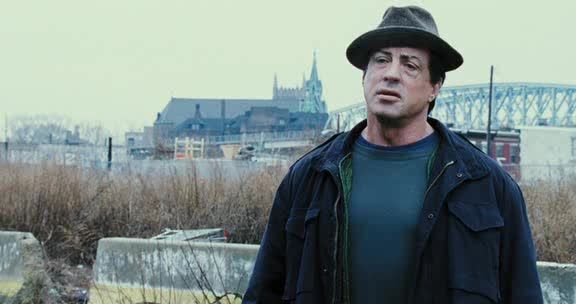
The Stallone of 2006 mirrors the Rocky we find in Rocky Balboa, which in terms of tone is a thankful return to the roots of the character (and truthfully the first time we’ve seen the true essence of Balboa’s personality since II). Balboa owns a successful restaurant, where he’s an attraction telling boxing stories to customers but his life away from there is in a rut. He’s grieving the loss of his beloved Adrian and is unable to let go of the past, regularly spending time at her grave and yearly goes on a tour of all their meeting places which finally infuriates old friend Paulie who claims Rocky is moving backwards while the world moves forwards.
Stallone does some of his best acting in years as the troubled Balboa, especially in a moment in the old meat factory he used to train in, where he confides to Paulie that he’s thinking of fighting on small local shows. Despite his often poor qualities as a person, Paulie shows his worth as a friend able to draw out of Rocky the depths of his grief and the hurt that won’t leave him due to Adrian’s passing. It’s a heartbreaking moment, Rocky through tears and seething with pain admits who hard the loss he is feeling is and the normally mocking Paulie responds for once with tenderness.
Much of the film is spent on Rocky’s life away from the ring and those around him. He befriends a barmaid Marie and her son, she been the same character who he walked home in the first film as a child and told him “screw you.” He has a fractured relationship with his son, who struggles living in the shadow of his father and is frustrated at finding his own path in life. Even Paulie falls on hard times when he is laid off at the meat packing plant.
Running alongside Rocky’s story is the one of Mason Dixon, the current champ and Rocky’s eventual opponent in the ring. Though successful, Dixon is not liked by the pubic and a string of bland contenders prevents him from attaining a legacy. Despite his riches, he’s unfulfilled and frustrated by those controlling his career. His mood isn’t helped when a simulated computer boxing match pits a Rocky in his prime against Dixon and declares the beloved legend as the winner. This sparks and “exhibition” bout between the two, with the promoters hoping the gesture will redeem Dixon’s popularity.
Naturally the fight scenes in Rocky Balboa are everything you would expect, wonderfully choreographed and with a heart pounding build of intensity. In a creative move the scenes in the ring are mostly shown from the point of view of television cameras and recreates the sheen of a sports television picture. As always they stretch the bounds of credibility (no way would Rocky be allowed to take the punishment he does by any referee) but you’re drawn into the fight by the drama and the use of that inspiring score, along with a professional commentary team selling the fight, the result is a finale that has it’s way with your emotions.
I saw this film in the cinema and you could feel the audience on the edge of it’s seat, rooting for Rocky and totally engrossed in the fight as if it was a real sporting event they were watching. The psychology of the fight tells a story, that successfully makes the concept of Rocky being able to hold his own conceivable with Dixon suffering an injury and being forced to fight through it. Unlike the normal trope of Rocky fighting a villain, here you have two fighters with a genuine purpose driving them, Rocky fighting for his pride and to put to rest his demons (and perhaps Stallone himself redeeming himself for Rocky V) while Dixon shows his courage and worthiness of a champion.
Rocky Balboa is a stunning return to the roots and glory of the original, recognising the success of a Rocky is not simply the fight in the ring but the emotional battle within. It’s a unashamed fan pleaser, bringing back Derrick Dukes as Rocky’s trainer (the speech he gives running down Rocky’s physical ailments is hilarious “we need speed, you don’t have it”) and the character of Spider Rico who was the fighter Rocky faces at the beginning of the first film. It brings a real lump to you throat, especially with the shot of Rocky fading off into the distance after visiting Adrian’s grave and the final shot in the credits which shows a shadow of him on the famous steps of Philadelphia accompanied by the haunting Rocky music (preceding by a fun montage of people recreating the run up the steps).
This was a fitting, emotional end to the Rocky saga. Naturally we didn’t release that there were still great times ahead.

Casino Royale (director: Martin Campbell)
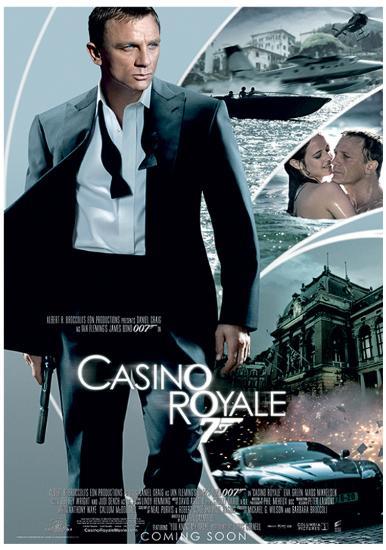
After earning his “00” credentials, James Bond is assigned to track down a financial genius “Le Chiffre” who uses his skills to invest the money of terrorist groups. When a desperate Le Chiffre enters a high stakes poker game to recoup lost money, Bond attempts to ensure he loses to force him into accepting sanctuary from his terrorist investors.
In October 2005 a beefy guy with a very non flattering floppy blonde haircut, got off a speedboat on the Thames for a press conference prompting me to say with horror “That’s him? That guy is our new James Bond?” Like many fans of the traditional James Bond I was not impressed, and maybe I’d have had different opinions if I’d already seen Munich by this point. Which just goes to show when it comes to casting choices, arseholes like me should just shut the fuck up, let professionally qualified film makers do their job and wait to see what they come up with before inflicting my opinions on the world. Because Daniel Craig turned out to be a bloody brilliant Bond and breathed much needed new life into the 007 franchise.
Fact is, James Bond was not in good shape when we reached the mid 00’s. Although Pierce Brosnan had the suave and class of the role, he’d been saddled with formulaic and increasingly dumber premises (Goldeneye the exception). With the Cold War long gone, Bond struggled to find any relevancy in the new millennium and although I’m beating on a familiar drum here, the reality of 9/11 made the 90’s 007 movies passe and cartoon like.
Casino Royale brought us a Bond for our times, right from the opening scene. We see two sides of this new, gritty Bond as he earns his 007 status with his first two kills. In a black and white scene, with a suitably Cold War vibe, Bond confronts and shoots in cold blood a section chief who has been selling secrets. The calculating, flippant kill is interspaced with scenes of Bond fighting and killing the chief’s contact in a public restroom. This is a departure from the crisp, clean fights we’ve come to expect in modern Bond. This is a brutal, violent ugly encounter. Both combatants bloody and sweating, dishevelled and breathing heavy, Bond is Savage as he first tries to drown his target in a sink and then strangles him to death.
This is a Bond that harks back to the original image of the Fleming novels (far more than any other Bond ever did, including Connery), and it’s apt then that this re imagining uses the original Bond novel Casino Royale as it’s basis.

“God I miss the Cold War,” Judi Dench’s M says (by apprising her role she gives credence to the multiple Bond theories but that’s another story), and it’s a sign of the more complicated times that the MI6 and Bond find themselves in. This is a world where caught on camera Bond killing a terrorist prompts a public scandal and where the real focus of a mission is to trap the financiers and accountants of terrorist cells.
Daniel Craig’s Bond in response is an ambiguous figure in keeping with a time when our heroes were necessarily been deconstructed. This is a Bond with flaws, he’s arrogant at times and makes blunders, many times he misreads people leading to him been outwitted. He’s also shown more vulnerable than any other Bond we’ve seen before. When he is captured and tortured by main Villain Le Chiffe (Mads Mikkelsen delightfully brimming with sadistic evil and callousness), he’s stripped naked and in a shocking moment tortured by having his testicles whipped with a rope. Bond tries gallantly to be defiant against his torturer, but his quips are accompanied by tears and trembling fear. He’s not even able to free himself and has to rely on a mystery man to be saved.
In a most unlike Bond moment he falls in love with his female companion Vesper Lynd (played elegantly and with real bite by Eva Green), and intends to resign from the service to be with her. Ultimately he’s betrayed and manipulated because of his feelings, and comes out of Casino Royale an even harder edged agent because of it.
All these elements from Daniel Craig and Casino Royale made Bond fascinating again. Still tough and cool, but flawed and in a more realistic 007 world, this Bond captivated fans especially with a cliffhanger that revealed the existence of a shadowy organisation that was manipulating events in an intriguing web. Naturally fans left the cinemas thinking they’d seen the first hints of long missed Spectre group.
Sadly with all the promise of Casino Royale, further instalments were very hit and miss. The build to sequel “Quantum of Solace” was promising, with promises of a reckless Bond out for revenge against a Spectre like organisation. Sadly the film was a long mess, not helped by the writer’s strike preventing rewrites, and the shadowy organisation Quantum proving to be a disappointment.
“Skyfall” on the other hand was a brilliant return to form, a gritty actioner that once again gave Bond a troubled persona as he wrestles with PTSD following a mission gone wrong. It even had one of the best Bond songs in years from Adele. So once again on track the franchise delighted fans with the news that the fourth Craig film would be entitled “Spectre,” and would see the return of favourite villain Blofeld. Sadly Spectre failed to deliver, with long, uninspiring set pieces and little of the emotional depth that made Casino Royale and Skyfall so compelling.
Next year we have the final Craig Bond “No time to die,” so we will see if this era ends with a 3-2 win for good instalments. Either way, Casino Royale can be looked back as probably the most intriguing and true to the real character of Bond that we ever saw on screen.

The Illusionist (Director: Neil Burger)

A mysterious magician causes controversy in Vienna by summoning the ghost of a young woman, who claims she was murdered by the corrupt Crown Prince Leopold.
It’s fascinating how many times we see similar themed movies released in a short amount of time. In 2006 there were no less than three magicians movies, the mostly forgotten “Scoop,” the hit “Prestige,” and the one that I actually saw and enjoyed the hell out of despite never having heard of it when I went to see it, “The Illusionist.”
The story of The Illusionist is a tricky one to discuss, because to do so takes away so much of the joy of film as it’s purpose mirrors the stageshow of Edward Norton’s shy magician (a role he is beautifully apt for) by tricking the audience with style and misdirection to reveal a surprising turn.
A young peasant boy is forced to stop seeing his childhood sweetheart Sophie who is a member of the aristocracy. He reemerges in 1889 Vienna having travelled the world to become a talented Magician, there he reconnects with his lost love who now is set to marry a ruthless (and violent towards his lovers) Prince who has plans to force his way to the throne via a coup. During a show where the he tries to belittle the shy magician by figuring out his tricks, the Prince is humiliated and responds by trying to banish him. When Sophie tries to end her engagement to the Prince she ends up murdered, sending the magician into a state of depression. He responds with a new show where he appears to summon the spirit of Sophie from the dead, he then names Prince Leopald as her murderer.

The Illusionist is a beautiful looking film, evoking the subtle beauty of Vienna (I assume, I’ve never actually been) and has a whimsical tone at times. The magic tricks performed with Norton’s easy going demeanour have a gentle sense of wonder, a theatrical, uplifting spectacle, aided by a joyful score of wonder. My favourite of them was the growing of the orange tree from seed to bearing fruit within minutes.
Performances across the board are great. There is a sweet quality to the chemistry between Norton and Jessica Biel as Sophie, while Rufus Sewell is satisfyingly hateable as the slimy, bullying, arrogant Prince Leopald. However it’s Paul Giamatti as the Chief Inspector Uhl that is the glue that holds the film together.
While a stooge of the Prince and tasked with shutting down the Illustionist’s show, Uhl also investigates the murder of Sophie and the possible role of the Prince in it. Uhl acts as our eyes in the film, he’s the one character in the film who is in the dark as to the true story of Sohie’s murder. As well as the mystery, he also shares our wonder for the work of the Illusionist. He’s a magic fan and in awe of the tricks even when his loyalty to the Prince puts him at odds with the Illusionist. He has a wonderful moment late in the film, with a look of rapturous joy and respect when he realises he has been outfoxed by the true trick of the film.
The Illusionist is a wondrous film, a mixture of mystery, romance and it has moments that will twist and surprise the perceptions of the audience.
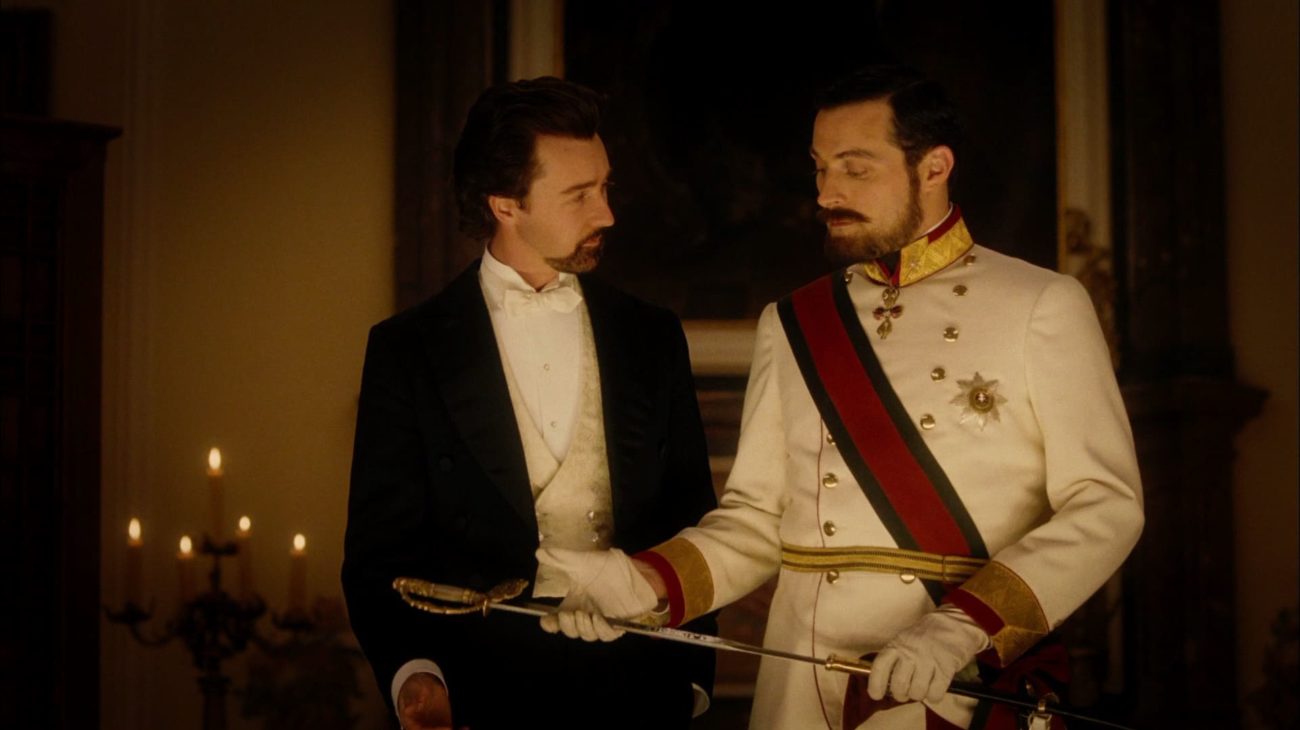
WTF? Moment: 300
I’ve found my WTF useful for a variety of reasons. Sometimes it lets me playfully highlight a surprising moment (both good and bad) in a film, reveal something very dodgy in hindsight, talk about a ridiculous premise or just use it to promote some interesting bit of trivia.
And occasionally it allows me to vent and get something out of my system, like when there is a movie that I absolutely fucking hate.
So I give to you 300, one of the most vile action films I’ve ever had the misfortune to encounter. I hate this chuffing film.

The battle of Thermopylae is one of the most heroic, stirring stories in Ancient History. The story of a small army of Spartans holding back the vast invading Persian army (Stephen Pressfield wrote a fantastic novel called Gates of Fire that is worth seeking out, also Wolvering mentioned the battle in Uncanny X-men 226) is perfect for a inspiring movie of brotherhood, bravery and sacrifice.
Sadly how I found the film was an ugly film with a stench of machismo, arrogance and cruelty throughout. Never have I witnessed a bunch of “heroes” who were so unlikable, to the extent I couldn’t root for them and began cheering for the Persians to give them a damn good kicking. The Greece that they were protecting was a culture that revelled in a nasty, extreme masculinity, sacrificed young women in dirty old fucks, was demeaning towards homosexuals (even though in reality the Spartans would have been all over each other), and generally left disabled babies to die in the wild.
Seriously when Cersi Lannister smugly pronounced that “only Spartan women could breed real men,” I just though bitch, get over yourself!
300 does have some amazing visuals (the image of the Persian elephants as alien monstrosities is truly stunning) and fight sequences, with a great score but it doesn’t hide the bitter, dirty feeling I got watching this film.
So much did hate it, I actually found myself enjoying the spoof Meet the Spartans so clouded was that someone was giving 300 the kicking it so richly deserved.
Oh spoiler they all die at the end, and not before time.
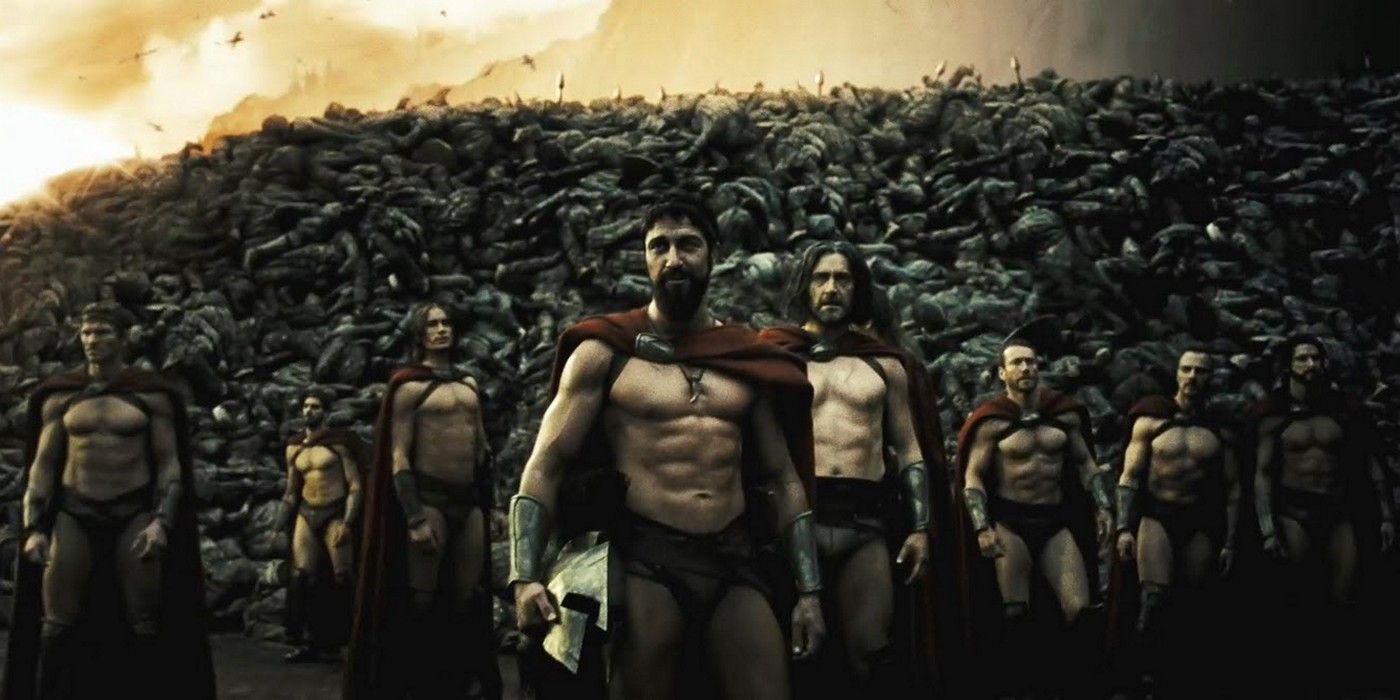
That’s all from 2006, with only ten more years to cover before I find something else to write about.
Darren

